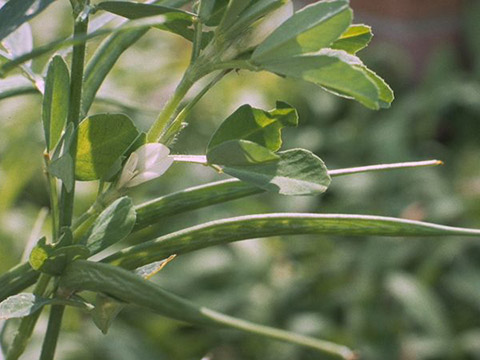Botanical name
Trigonella foenum-graecum L.
Family
Fabaceae
Common name
Fenugreek, Greek clover, Greek hay, Greek hayseed
Information about the plant
Fenugreek is native to the eastern Mediterranean region. It is also cultivated in countries in the Middle East to obtain seeds, which are mainly used as a spice, as well as in Morocco, southern France, Greece, Ukraine, California, Argentina, and China. The genus name Trigonella was artificially created by Linné in 1737 from the Latin 'trigonus' = triangular, three-edged, and then given the diminutive form '-ella' ("the little three-edged one"). This alludes to the shape of the flower which, because its keel is very small, consists practically only of the 3 petals - 2 wings and 1 standard - and therefore looks triangular. The species epithet foenum-graecum translates as "Greek hay", presumably because the plant is very common in the meadows of Greece.
The annual plant grows up to 65 cm tall. The stalked leaves are trifoliate (clover!), with the middle leaflet having a long stalk. Otherwise, the individual leaflets are obovate, usually dentated in the upper third. The pale-yellow butterfly flowers, light purple at the base, sit in the leaf axils, the wings are about half as long as the standard, the keel is very small, blunt, and roundish. The flowering time is between April and July. The fruit is a curved, pointed pod that can grow up to 10 cm long and contains 4 to 20 seeds. These are flat and divided into unequal halves by a deep furrow, otherwise egg- to cube-shaped, yellow-brown; they are very hard when dried. The German name "Bockshornklee" refers to the shape of the fruits, which stand like the "horns of goats" in the calyxes on the stem.
Medicinally used parts of plants (herbal drug)
The ripe seeds (fenugreek seeds - Trigonellae foenugraeci semen) are used. The commercially available drug comes exclusively from cultivation and is imported from Morocco, Turkey, and China, and in some cases also from India and Argentina.
Constituents of the herbal drug
Fenugreek seeds contain mucilage, steroid saponins, bitter substances, and the aroma-determining, volatile sotolon.
Quality of the drug
The quality of the fenugreek seeds (Trigonellae foenugraeci semen) is specified in the European Pharmacopoeia (Ph. Eur.).
Medical applications
Recognised medical use
The HMPC has classified fenugreek seeds as a traditional herbal medicinal product (see "Traditional use").
ESCOP: Internally as adjuvant therapy in diabetes mellitus, loss of appetite, and as an adjunct to a low-fat diet in the treatment of mild hypercholesterolemia; externally for furunculosis, ulcers, and eczema.
Traditional use
Fenugreek seeds have been classified by the HMPC as a traditional herbal medicinal product (Article 16a of Directive 2001/83/EC). Based on long-standing use and experience, fenugreek seeds can be used internally for temporary loss of appetite and externally for symptomatic treatment of minor skin inflammations.
Herbal drug preparations in finished dosage forms
Powdered fenugreek seeds for tea preparation (internally) or for the preparation of a poultice (externally crushed fenugreek seeds in tea mixtures).
Dosage
Finished medicinal product: see patient information leaflet.
Tea: Drink a cup of fenugreek tea 3 to 4 times a day; to stimulate the appetite, the tea should be drunk half an hour before meals. Daily dose: 6 g of the drug.
Fenugreek seeds can also be consumed directly in powdered form; dosage: take 2 g of powdered drug 3 times a day before meals with a little liquid.
Fenugreek seeds are used externally as a warm, moist poultice (boil 50 g of powdered fenugreek seeds with 250 ml of water for 5 minutes).
Preparation of a tea
Pour approx. 150 mL of cold water over 0.5 g of powdered fenugreek seeds. After two hours, filter through a paper filter.
Notes
Since fenugreek seeds have blood sugar-lowering properties, diabetics must check their blood sugar levels more frequently when taking fenugreek seed preparations regularly.
No safety studies are available on the use of fenugreek seeds during pregnancy and lactation. The use in children and adolescents under the age of 18 years is not recommended due to a lack of evidence.
Side effects
When used internally, slight gastrointestinal complaints are possible; repeated external use may cause undesirable skin reactions.
Interactions
None known.


